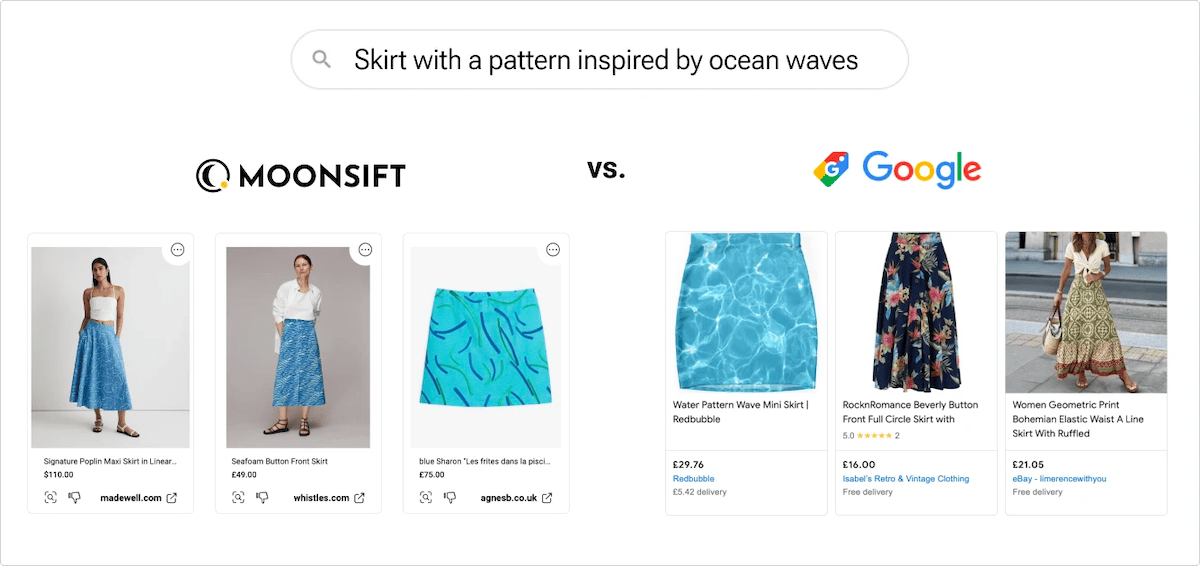
UK-based startup Moonsift is harnessing the power of AI—using machine learning models and Weaviate’s vector database—to help online shoppers discover the products they love.
Moonsift offers an ecommerce browser extension for users to curate shoppable boards with products from across the internet. Stylists and curators use Moonsift to create collections, registries, and wish lists that can be shared and shopped with a simple link. While thousands of customers add products from tens of thousands of retailers per month to Moonsift, co-founders David Wood and Alex Reed have a bigger vision for improving product discoverability for online shoppers.
With combined experience in natural language processing (NLP), data science, and consulting for retail brands, Wood and Reed saw how retailers unknowingly restrict their own discoverability by tailoring keywords for search engines rather than users. How even with the most illustrious descriptions, shoppers struggle to find the products they’re looking for. They knew that retail discoverability wasn’t what it could be, and built Moonsift to improve it.
From the beginning, Wood and Reed’s vision was to use the power of AI to help shoppers more easily discover the products they love.
Collecting data to enable understanding
The first generation of Moonsift has been a stepping stone toward this vision. In order to create a comprehensive AI shopping copilot, they needed product data from retailers along with cross-retailer shopping data to enable understanding of the discovery process and train machine learning models. And that’s exactly what they’ve been collecting. Usage of their browser extension over the last few years has enabled Moonsift to explore discovery and train models on over 60M products, 250M interactions, and 40K retailers across the internet. Now, Moonsift has the data they need (which is growing every day) to improve product discovery with AI.
Building the discovery engine
The Moonsift team brought on Marcel Marais as lead machine learning engineer to build a system that could harness the data they’ve gathered to take their product to the next level. At first, Marais looked at improving discovery through a keyword-based search system using BM25 and re-ranking, but he quickly assessed that would not be sufficient to power the type of recommendation engine they needed. He needed to implement semantic search, a system that could interpret a user’s intent rather than rely on exact keyword matches. And they needed a system that could index and search multimodal (text and image) data across millions of objects. Based on prior experience with semantic search and vector embeddings, Marais decided a vector database was the tool for the job.
Marais quickly put together a checklist of priorities for their vector database selection. Moving fast was important, so ease of use was at the top of the list. The company preferred an open source platform, and since they would be indexing millions of products, they needed a solution that was both high-performing and cost-efficient at scale.
Selecting Weaviate as the vector database of choice
After a thorough evaluation of a handful of open and closed-source vector databases, the team decided that Weaviate was the best-fit solution for their needs.
They cited the following reasons for choosing Weaviate:
- Open source, with an active community and managed cloud offering.
- Comprehensive documentation and strong support for popular LLMs and multi-modal models.
- Direct integration of machine learning models using a module system, with the ability to easily swap out and experiment with different models.
- Advanced monitoring and replication capabilities.
- High query throughput at scale.
- Unique search features to drive performance and efficiency (using important aspects of both keyword and vector search).
“Weaviate was exactly what we needed. Within a couple of weeks we had a production-ready AI-powered search engine. We’re confident in knowing we don’t have to trade performance for scale.”
– David Wood, CTO and co-founder, Moonsift
Next steps
Moonsift is now getting ready to launch their AI Copilot to the world. They’re seeing early results of the power of its ability to understand user intent and serve intelligent results. Some fun examples include “shirt that looks like a Caipirinha” or “skirt with a pattern inspired by ocean waves”.

As Moonsift prepares for the public launch of its shopping Copilot, the team is continuing to explore ways to optimize the cost, performance, and scale of their system. They are looking into Weaviate’s new feature, Product Quantization (PQ), which helps reduce the memory footprint of their system, by compressing vectors and performing rescoring, while retaining search relevance. Along with PQ they are also exploring multi-tenancy that will allow them to scale and perform personalized vector search for millions of customers.
See a demo of Moonsift’s shopping Copilot, and sign up for early access today!
Ready to start building?
Check out the Quickstart tutorial, or build amazing apps with a free trial of Weaviate Cloud (WCD).
Don't want to miss another blog post?
Sign up for our bi-weekly newsletter to stay updated!
By submitting, I agree to the Terms of Service and Privacy Policy.
